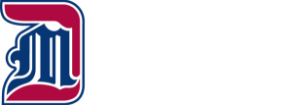Dental Hygiene Degree Completion Structure and Scheduling
The terminal degree, a Bachelor of Science in Dental Hygiene, requires a minimum of 126 credit hours for fulfillment and is granted by the University of Detroit Mercy School of Dentistry. There is no time limit for completion. On-line coursework is available to degree completion students.
- The University of Detroit Mercy Core Curriculum that is required to complete the BS degree will be taken on the Mc Nichols campus. These courses are offered during the day, at night, or in the Weekend College (Friday and/or Saturday) and are generally offered during each semester.
- The Dental Hygiene Core classes are taken on the Corktown campus, home of the School of Dentistry. These courses are sequential and should begin with the Research Methods course in preparation for the Practicum and then Capstone.
Due to the past coursework in prerequisite and dental hygiene courses, the program individualizes curriculum for each student.
An individual transcript evaluation is performed for each applicant to determine the maximum number of transfer credit hours allowable. Traditionally, a maximum of 63 credit hours is accepted from accredited community college dental hygiene programs; however many community college dental hygiene programs have articulation agreements with the University of Detroit Mercy. These agreements allow a larger number of credit hours to be transfer, up to 96 credit hours.
Degree completion students will need between 30 and 63 additional credit hours to fulfill the BS degree. While there is an unlimited amount of time to complete the program, a minimum of 12 semester hours per semester is needed. Senior residency requires the last 30 credit hours for any student are required to be taken at the University of Detroit Mercy.
If any of the UDM or Dental Hygiene core coursework has been successfully completed prior to a student’s admission, and if additional credits are required to fulfill the 126 credits required for the BS degree, electives are added in the student’s area of interest. Electives can be fulfilled by either additional coursework or by directed studies.
- Elective opportunities may be fulfilled by coursework in other University colleges such as education, business, management/administration, psychology, and/or counseling and more.
- Directed Studies are supervised by dental or dental hygiene faculty and may include research, publication of research, clinical or didactic teaching and/or a host of other applicable opportunities in other dental specialties. These opportunities will allow exploration into fields associated with dental hygiene, but may not specifically deal with the traditional aspects of the profession.
-
Articulation Agreements
The following table lists the maximum transferable credit hours allowable from each school into the University of Detroit Mercy Dental Hygiene Degree Completion Program.
Dental Hygiene Program Maximum Transferable Credit Hours Baker College 96 Delta College * 92-95 Ferris State University 96 Grand Rapids C.C. * 96 Jackson C.C. * 81/82 (2019- Present) Kalamazoo C.C * 76-84 (2012 to present) Kellogg C.C. * 78 Lansing C. C. * 84- 93(2019- Present)
92.5 (2011 to 2018)
80 (2005 - 2010)Mott C.C. * 88 (2019- Present)
84 (2011 to 2018)
90.5 (2006 - 2012)Oakland C.C. * 90.5-91.5 2019- Present)
92.5 (2011 to present)
88.5 (2005 - 2010)Owens C.C. * (Ohio) 80 Rhodes State College *
(formerly Lima C.C.) (Ohio)71 (2019- Present)
73 (2012 to 2018)St. Clair College of Applied Technology
(Windsor, Ontario, Canada) *96 (2014 - present)
84 (2002 - 2013)
80 (1999 - 2001)
63 (1985 - 1998)University of Michigan 96 Wayne C.C.C.D. * 96 * Each community college maximum is based on an Articulation Agreement between the college and the University of Detroit Mercy.
